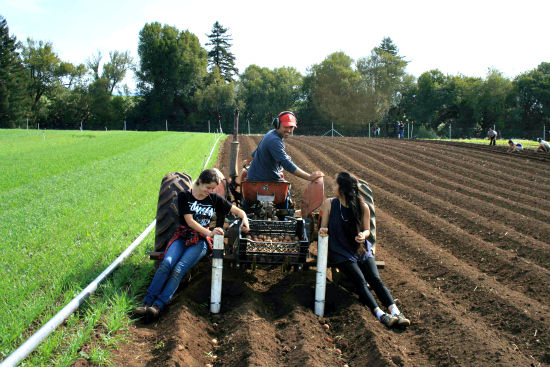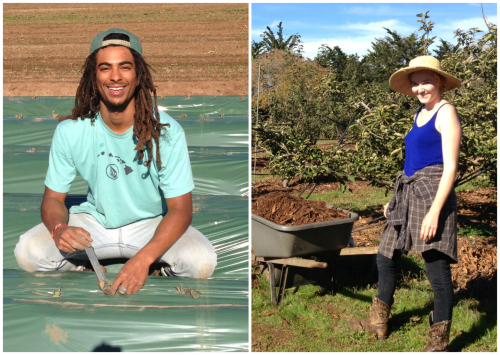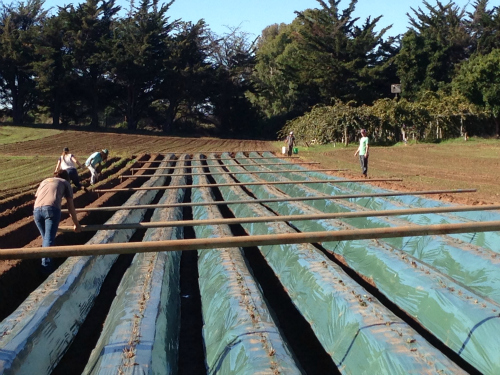As their peers settle into lecture hall seats, two dozen UC Santa Cruz interns grab a harvest bucket, a set of pruners, or a digging fork and head out to the fields and orchards of UC Santa Cruz’s organic farm and gardens. They’ll spend the morning working at whatever the season demands: planting, harvesting, pruning, making compost, or packing crops for the campus dining halls.
The interns are part of an evolving effort by UCSC’s Center for Agroecology and Sustainable Food Systems (CASFS) to integrate undergraduates into the seasonal work of the campus’s 33 acres of organic farmland and market gardens. With support from the Clarence E. Heller Foundation and a U.S. Department of Education Higher Education Challenge Grant, CASFS staff and UCSC faculty have crafted an internship program that complements the environmental studies major’s new concentration in agroecology and sustainable food systems.
Food systems focus
Beginning this fall, environmental studies majors are able to add a concentration in agroecology and sustainable food systems to their undergraduate major. The major academic objective is to provide students with a depth of expertise within the environmental studies major. Students will learn about ecological concepts that can be applied to the development of sustainable agricultural systems and will also develop their understanding of social, political, and economic aspects of agriculture. Students will also have access to hands-on experiences, and obtain skills in research, fieldwork, production, and communication.
Internships aren’t a new concept for CASFS; UCSC students have been seeking opportunities to get their hands dirty since Alan Chadwick arrived to start the Student Garden Project (now the Alan Chadwick Garden) nearly 50 years ago.
“What’s new about this internship program,” said Stacy Philpott, environmental studies associate professor and CASFS interim executive director,“ is the coordination, and ‘scaffold’ programming. We hope interns will take a two- or five-unit internship for a few quarters to take in some basic information, and then those students who are really engaged will continue to do individual project-based senior internships, or be hired as student assistant field managers.”
Interns in the program spend three four-hour sessions a week working on UCSC’s organic farm. They also discuss readings about sustainable agriculture and meet with their faculty sponsor to talk about how the internship may help them shape their career interests.
Adding context to the classroom
Darryl Wong, a CASFS farm manager and instructor, sees the internship as a way to give students a broader context for their classroom education. “It provides hands-on experiences in the concepts they learn about in many of their environmental studies classes, things like water quality, soil biology, pest and disease issues, and biodiversity,” Wong said. “Our focus is for them to be moving and learning to support the academics.”
Just as important, he says, is to provide students with a realistic sense of what it takes to produce food. “Especially these days we’re bombarded with glossy media about how sexy and romantic organic farming is. When the students see what’s involved, they understand the real work that goes into it — the knowledge and skill set it requires as well as the physical demand.”
The chance to work outside is what attracts many interns to the program, which accepts up to 25 students per quarter. Environmental studies student Miguel Peña said he sought out the internship because, “I knew it would serve as a venue for experiential learning. The ability to practice what one learns is important to me because it helps solidify my knowledge on the given subject.”
Much of the teaching takes place in a question and answer format as the students work alongside CASFS farm and garden managers. “Today, for example, we were laying plastic mulch for next year’s strawberry crop,” said current intern Charlotte O’Brien, a junior. “We were able to ask about why we were preparing the beds that way, why a crop rotation was important, what diseases were a problem. For me, it’s a lot more effective than sitting in a classroom.”
Veronica Thao, a 2014 intern, echoes that thought. “The internship helped me to better understand the material I was learning in my classes because I was actually out there experiencing some of the work myself.”
Delivering real food
That work includes being part of a team of undergraduates who plant, grow, harvest, and deliver organic food to their own dining halls and to supply a weekly “pop-up” produce stand in the heart of campus. For students it creates a direct connection to the campus food system, and as Wong explains, “It’s helping to meet the goals of the campus’s Real Food Challenge,” a commitment to source 40 percent of UCSC Dining’s food from local, sustainable sources by 2020.
Interns also plug into ongoing research projects taking place at the CASFS Farm, including current research on organic alternatives to soil fumigants for growing strawberries, and a study on root maggots in organic cropping systems.
The internship revolves around the seasonal work at the CASFS Farm and Alan Chadwick Garden. In spring, interns spend time in the greenhouses, and prepare and plant beds; in the fall they harvest and pack crops for delivery to UCSC’s dining halls and sow cover crop seeds, and in the winter they pitch in with fruit tree care and making compost.
Damian Parr, education coordinator for CASFS, says the internship program is designed to complement the annual Apprenticeship in Ecological Horticulture, a six-month, full-time residential training in organic farming and gardening offered by CASFS.
In place for nearly five decades, the apprenticeship has laid the groundwork for the thriving educational and research farm and gardens that are available to UCSC students and faculty. Interns benefit by working directly with the CASFS apprenticeship instructors, who have decades of experience in teaching both the theory and practice of agroecology and sustainable agriculture, as well as a background in what it takes to grow organic food on a commercial scale.
Thanks in large part to the apprenticeship, the environmental studies students who are drawn to the campus’s farm and gardens, and UCSC’s ground-breaking agroecology research and education efforts, the campus is a leader in agricultural studies and training despite its lack of land grant status or a formal agriculture major. Parr received funding from the University of California’s Global Food Initiative to document best practices for experiential learning to share with other universities and colleges.
Expanding opportunities
UCSC’s reputation as a center for sustainable agriculture drew Mike McDonald, now a senior environmental studies major, from his home in Bethlehem, Penn. “I'd heard great things about UCSC's agriculture education from friends and strangers all across the country, and I knew this was where I wanted to complete my undergraduate studies,” McDonald said. “The CASFS internship gave me time outdoors learning new skills, and opened doors for new opportunities I hadn't even considered. My expectations were high, but the internship still exceeded them.”
Ryan Duncans, a senior, shares a similar story. “I was working at an organic learning center at Santa Monica Community College,” he said. “When people heard that I was interested in sustainable agriculture they pointed me to UCSC. “
Duncans found the internship to be a good way to combine his class work with the practical workings of the farm and gardens. “Being on a functioning farm and garden and seeing food being produced by people who really knew how to do it was the best part for me. I hadn’t worked with people with those sorts of skills and in a setting with this intensity of food production.”
McDonald and Duncans are both part of the first class of environmental studies majors who will graduate with the new concentration in agroecology and sustainable food systems as part of their transcripts. And they’ve both benefited from the “pipeline” effect of the internship, with McDonald now working with Philpott’s research group, where he’s helping with a garden-based biodiversity study, and Duncans landing a job as a student farm manager.
Careers and engagement
For senior Eric Brunschweiler, the internship also led to a job on the campus farm and solidified his plans to make farming a career. “I've been working as a student manager with Darryl [Wong] and Kirstin [Yogg], and have been rising early to set gopher traps, run irrigation sets, and harvest to meet dining hall orders. I wouldn't have been hired if I hadn't interned for two quarters, and neither would I be as sure about where I want to take the rest of my life.”
Parr envisions that the CASFS internship will continue to evolve, and with 40 or more students per quarter interested in the program it’s clear that student demand for such opportunities is strong. “We provide one of the best chances to get field experience in both production and research,” says Parr. “We’re now moving toward more upper division internships and senior exit internships as we build the capacity at the introductory level.”
Wong acknowledges that although only a minority of interns is likely to pursue a career in agriculture, he sees the chance to expose students to the realities of farming as a critical way to create a more informed and engaged populace.
“Whatever fields our interns enter, we’re giving them a way to link policy with practice and a larger understanding of agriculture’s impacts,” Wong said.





